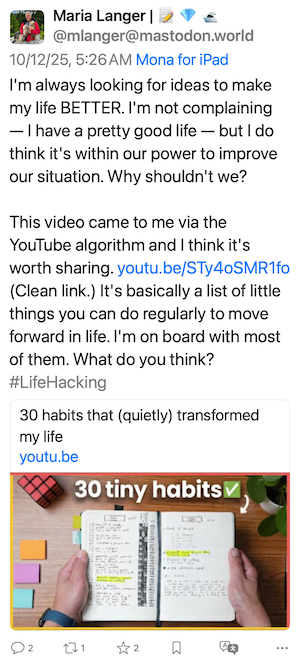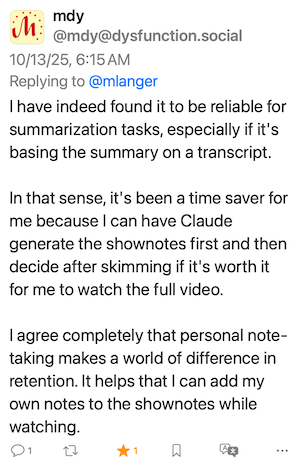I’m impressed by a 15-minute you tube video and surprised by how the Claude AI/LLM summarized it.
I’ll try to keep this short. Let’s see how I do.
As some people know, I often watch boring YouTube videos on my iPad in the middle of the night to help me sleep. The other morning — probably too late to get back to sleep anyway — this one was suggested to me. I tapped it and was soon pulled in by the concise way the creator presented 30 excellent tips in about 15 minutes.
If you’ve got 15 minutes to spare and think your life could use some improvement, I highly recommend watching this. (If you don’t think your life can use some improvement, you’re only fooling yourself; we can all improve.)

I shared the video on Mastodon, as I often do when I see something I believe is really worth watching.
Now if you were expecting some talking head with a big microphone in front of his face and lots of letters after his/her name to read off a teleprompter while mostly unrelated stock footage appears randomly in the background, you will be disappointed. Or, in my case, pleased — I hate those kinds of videos.
This video has some simple graphics to look at while listening, but it doesn’t need to be seen. You can just listen. Or you can do what my Mastodon friend MDY did: feed the transcript to Claude AI and let it summarize it. She shared the link on Mastodon, too: https://claude.ai/public/ artifacts/d5ad56a1-46fe-47ab-9fc7-5f3958dd1b08.
I clicked the link and was immediately impressed (and a little surprised) by the well-organized summary that appeared. I was impressed because, on first glance (and subsequent analysis), it appears to be both accurate and correct — something I’m not accustomed to seeing with AI results. That’s why I was surprised.
Now I’m no fan of AI systems. Not only are they failing miserably most times they’re used to take a human out of a process, but they have huge environmental impacts, sucking power and water that is already costly to produce or downright stupid to waste. I have read more than my fair share of AI horror stories, from lawyers idiotically trusting them to write briefs (that clients are paying hundreds of dollars per hour for a legal processional to write) to programmers spending more time fixing AI-generated code than writing it from scratch.
But at the very top of my list of reasons to hate AI systems is the simple fact that they are being developed and promoted as a way to cut labor costs — yes, the primary purpose is to add to worldwide unemployment.

MDY explained how and why she uses AI to summarize content.
During our subsequent discussion on Mastodon, MDY made a good argument for using an AI like Claude to summarize video. She uses it to summarize content in seconds and then uses that summary to decide whether it’s worth watching the video (or one can assume, reading the article). I have to agree that if the content is long and the summary is concise, AI can save someone a lot of time, enabling them to focus on details in the content they find most valuable.
I do wonder how much time was saved in this example, though; the summary was more than 1600 words.
I also worry about people leaning on AI for tasks like this and losing the ability to create summaries for themselves. I compared an AI summary to the book reports we were required to write in school. What happens if we all just use AI for tasks like this and are then put into a position where we have to do it for ourselves?
I compare the potential loss of this skill to my own loss of spelling capabilities. I used to be a good speller. Really! But that skill is slipping away. I find myself more and more dependent on my computer or mobile device to flag or correct spelling on the fly. Sometimes, rather than look up or make an educated guess at the spelling of a word, I’ll type in something close and let my computer tell me the word I want. I’m not happy about this, but not motivated to turn off spelling check and tackle spelling on my own.
(For the record, I don’t and won’t use a grammar checker. For Pete’s sake, I am a writer. If I can’t get grammar and related style issues correct, I shouldn’t be writing at all.)
And has anyone ever considered the motivations of AI developers to get us addicted to using their systems for things we should be able to do on our own? Do you think the free systems will be free forever?
I guess my thoughts can be summarized as follows:
- This video (and yes, the AI summary) is chock full of useful tips that can make your life better. Seriously, if you haven’t watched it yet or read the summary, why the hell not?
- Yes, there are things an AI can do for you to make your life easier. But I still don’t think that includes creating original content that requires thought and creativity.
- AI should not be replacing people in jobs. Related: A person’s job should not be to check and correct “original” content created by AI.
- People should avoid technologies that do the thinking for them. “Use it or lose it” applies to your brain, too.
I don’t know about you, but I like to think for myself. While I can see the utility of the Claude summary MDY shared, I won’t be playing with AIs to summarize content for me any time soon. I’d rather do it the old fashioned way: by paying attention to what’s in front of me and, when appropriate, taking my own notes for future reference.
And look at that! I kept it under 1,000 words!
Discover more from An Eclectic Mind
Subscribe to get the latest posts sent to your email.
